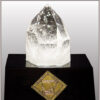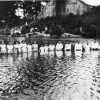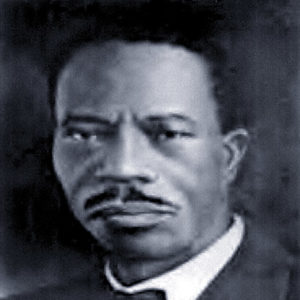calsfoundation@cals.org
Charles Harrison Mason 1866–1961
A renowned preacher and the founder of the Church of God in Christ (COGIC), the largest African American Pentecostal denomination of the twentieth century, Charles Harrison “Bishop” Mason ordained both black and white clergy in the early 1900s, when few did so. Mason was baptized, licensed, ordained in Arkansas, and he preached his first sermon in Preston (Faulkner County).
Charles Mason was born on September 8, 1866, on the Prior Farm near Bartlett, Tennessee. His parents, tenant farmers Jeremiah “Jerry” Mason and Eliza Mason, had been converted to Christianity while they were slaves and attended the Missionary Baptist Church. Mason had two brothers and one sister. When Mason was twelve, a yellow fever epidemic forced his family to move from Tennessee to John Watson’s plantation in Plumerville (Conway County). The following year, Mason’s father died from yellow fever, and Mason himself was sickened with tuberculosis in 1880. On Sunday, September 5, 1880, Mason experienced a vision of God and walked outside unaided. His half-brother, the Reverend Israel S. Nelson, baptized him at the local Mount Olive Missionary Baptist Church. Mason then entered the ministry as a lay preacher.
Mason married Alice Sexton on January 15, 1890, in Faulkner County. Formally licensed to minister by the Mount Gale Missionary Baptist Church in Preston in 1891, he began his preaching career in Arkansas. Mason soon learned that his wife did not want to be married to a preacher; they were divorced within two years, leaving Mason depressed and suicidal. He entered Arkansas Baptist College on November 1, 1893, but he left within two months, unhappy with their teaching methods and presentation of the biblical message.
Mason preached his first official sermon, on holiness, in 1894 in Preston. In his doctrine, Mason was inspired by Amanda Smith, another African-American holiness evangelist, and by John Wesley, among others. While most Baptist groups, along with many other Christian denominations, emphasize the forgiveness of sins as a central teaching, holiness preaching places a much higher regard on sanctification—that is, on living a life fully obedient to God’s commands as written in the Bible. This difference in doctrine caused Mason’s congregations to reject his ministry, but expulsion from the Baptist pulpit in 1897 did not change Mason; he kept preaching holiness in various places, including an abandoned cotton gin in Lexington, Mississippi. The “gin house” became the birthplace of the Church of God in Christ. The name, which Mason said had been given to him by God as Mason walked down a street in Little Rock (Pulaski County), was drawn from 1 Thessalonians 2:14. Mason’s many preaching forays brought him into contact with other preachers who preached sanctification, such as Charles Price Jones, John E. Jeter, and W. S. Pleasant. These men collaborated in organizing the new denomination; Jones as the general overseer, Mason over Tennessee, and Jeter over Arkansas.
As Mason worked at organizing the new denomination, he heard the news that his former wife had died. Consistent with his holiness doctrine, Mason had remained convinced that he could not remarry while his former wife still lived, even though they were legally divorced. After her death, though, Mason married Lelia Washington in 1905. By 1920, they had six children. She died in 1936, and in 1943—when he was seventy-seven years old and she was thirty-five—Mason married his third wife, Elsie Louise Washington, a Memphis, Tennessee, schoolteacher. She became very active in the administration of the Church of God in Christ, both as an office secretary and as editor-in-chief of the church’s journal, The Whole Truth Newspaper.
Hearing of the Azusa Street Revival in California, Mason felt called to go to Los Angeles; he considered himself to have received Jesus in the form of the Holy Ghost in March 1907. Returning to Tennessee, he began preaching the baptism of the Holy Ghost with the evidence of speaking in tongues. This theology of free and exuberant worship was not well-received by his former compatriots, and his associations with Price, Jeter, and Pleasant were soon over. Mason called for like-minded men to join with him in organizing the first Pentecostal General Assembly of the Church of God in Christ. Twelve men responded, and, when the meeting was over, Mason had been named the General Overseer and Chief Apostle of the denomination with the authority to formulate doctrine, set up the organization, and assign responsibility. He went on to win a court battle to reclaim the name of “Church of God in Christ.”
From 1909 to 1914, roughly equal numbers of African Americans and whites came to him for ordination (in 1910 alone, Mason ordained 300 white Pentecostal preachers). Mason wanted to see the denomination adopt the same vibrant and emotionally moving mannerisms that he had seen among former slaves, which were considered controversial—holy dances, ecstatic worship, and falling under the power of God.
Mason is credited with establishing the Young People’s Willing Workers program in 1914, a Sunday-school program in 1924, a foreign mission board in 1926, and numerous women’s auxiliaries.
Mason’s interracial work and his pacifism (although he preached allegiance to the United States and condemned the Kaiser) brought him to the attention of the Bureau of Investigation, the forerunner of the Federal Bureau of Investigation (FBI), which kept a file on him during World War I. In 1918, he was arrested and jailed in Lexington, Mississippi, because he had a German aide, Pastor William B. Holt.
Mason died on November 17, 1961, in Harper’s Hospital in Detroit, Michigan. His body was interred in the Mason Temple, headquarters of the Church of God in Christ in Memphis. On November 13, 2021, a marker commemorating Charles Harrison Mason was installed at the intersection of 8th and Gaines Streets in Little Rock.
For additional information:
Clemmons, Ithiel C. Bishop C. H. Mason and the Roots of the Church of God in Christ. Bakersfield, CA: Pneuma Life Pub., 1996.
Maxwell, Joe, “Building the Church (of God in Christ).” Christianity Today, April 8, 1996.
Smith, Raynard D., ed. With Signs Following: The Life and Ministry of Charles Harrison Mason. Atlanta: Chalice Press, 2016.
White, Calvin, Jr. “In the Beginning, There Stood Two: Arkansas Roots of the Black Holiness Movement.” Arkansas Historical Quarterly 68 (Spring 2009): 1–22.
———. The Rise to Respectability: Race, Religion, and the Church of God in Christ. Fayetteville: University of Arkansas Press, 2012.
Mary Menefee
Charlottesville, Virginia
Staff of the CALS Encyclopedia of Arkansas
 Arkansas Black Hall of Fame
Arkansas Black Hall of Fame Religion
Religion Charles Mason
Charles Mason 




Someone founds a company and creates a board. The board differs in the thinking of the person who founded it. They fire the owner or founder. Sounds like what they did to C. H. Mason. I’m trying to find out if I’m connected to him. My family was all over the east coast including Tennessee, Arkansas, Virginia, and Maryland. There are a whole lot of Masons out there, and I just want to know because I’m COGIC.
Being raised in holiness all my life, as a young child I received the Holy Ghost at age seven. In my growing up, I met our founder Bishop Charles Harrison Mason. He was at my mother’s church, where I attended also. He sat in a chair on the pulpit and prayed under the anointed of the Holy Ghost. As he touched some, they fell out under the power of God and got the fullness of the Holy Ghost. There was deliverance, healing, and refreshing. I shall never forget those days. OH WHAT A MAN OF GOD!!! who fasted and prayed for this church (COGIC). There will never be another like him. I am yet following his/my mom’s/dad’s leadership in holiness. I miss him greatly and the real holy women of God that really lived SAVED. WORDS REALLY CANNOT DESCRIBE OUR FOUNDER. HIS LIFE SPOKE FOR ITSELF. Hallelujah! Praise God Amen!
Bishop C.H. Mason got rebaptized in the NAME of JESUS in Detroit, MI by the late Bishop Hancock. He was about 60 when this took place. When he came back and told the general board of the COGIC, they thought he was going senile. Mason was never able to convince the COGIC general board to change the doctrine of the church (Acts 2:38-42). Mason, in latter years saw a vision of a train in the last days full of COGIC members and it was heading to HELL. Whatever you do in word or in deed do it ALL in the name of JESUS ~Colossians 3:17
This is the denomination in which I was born and raised. The teachings have forever kept my life in order.